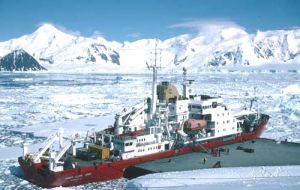MercoPress. South Atlantic News Agency
UK preparing sea bed claims off British Antarctica
 BAS vessel involved in scientific seabed data collection
BAS vessel involved in scientific seabed data collection The United Kingdom has increased the list of claims of seabed rights to include a large chunk off Antarctica, an area of over a million square kilometers, according to reports in the British press quoting a spokes-woman from the Foreign Office.
The British press said the move could be interpreted as contrary to the spirit of the 1959 Antarctic Treaty to which the UK is signatory and specifically states that no new claims shall be asserted on the continent. However even if granted, those rights would not allow Britain to contravene the treaty that prohibits oil and gas tapping under the seabed. The spokeswoman labeled the move "a safeguard for the future". The treaty was drawn up to prevent territorial disputes and the Environmental Protocol to the Antarctic treaty, agreed in 1991, prohibits all mineral related activity, other than for scientific research The UK press also points out that the claim on the Antarctica seabed will be most controversial because it depends on proximity to the British Antarctic Territory which overlaps rival claims by Chile and Argentina, two countries with a sustained Antarctic interest that consider themselves the natural wardens of the region. Britain has already submitted to the United Nations a joint claim with France, Spain and the Irish Republic for part of the Bay of Biscay; is in discussions with Iceland, Ireland and Denmark on a joint claim in the Hattan-Rockall area off the west coast of Scotland and is working on a claim to extend around the Falkland Islands, South Georgia and Ascension Island in mid Atlantic. "There are five claims in total that the UK is hoping to put forward; they are in the Bay of Biscay, around Ascension, off the British Antarctic Territory, around the Falkland Islands and South Georgia and in the Hatton/Rockall basin", said the spokes-woman adding that "we believe these five meet the geological conditions required. The claims are based on article 76 of the UN convention of the Law of the sea." This last claim, which the spokeswoman stressed is still being prepared in advance of a May 2009 United Nations deadline, could extend Britain's stake for Antarctic waters and potential oil, gas and mineral exploitation rights up to 350 miles offshore into the Southern Ocean, permitted under the Law of the Sea Convention. "This has been under consideration for many years," the spokeswoman said of the move, "which will not affect the more recent environmental protections put into the Antarctic Treaty in 1991.It would be a claim in name only we wouldn't act because doing any mineral exploitation contravenes the treaty". "There are a number of coastal states submitting claims," the spokeswoman said, adding that the technology does not yet exist to reach mineral deposits that can sit as far as four or five miles under water. The move signals Britain's willingness to join the current rush by countries to try to secure their potential oil, gas and mineral rights to sea-beds should circumstance change. The most notable recent examples were the claim by Russia over the Arctic seabed and France that registered a claim to thousands of square kilometers around New Caledonia, in the Pacific "It is essentially to safeguard for the future and if (the treaty) is abolished in the future we will have safeguarded our claim to that area," the Foreign Office spokeswoman said. She added that any change to the ban on mineral exploitation in the Antarctic is "highly improbable". Currently, five-sixths of the Antarctic continent is claimed by seven countries and most of the existing British stake is also claimed by either Argentina or Chile. The British Antarctic Territory claim fans out from the South Pole in a wedge that takes in more than a million square kilometers. The area was first staked in 1908 and the Foreign Office says it now houses two permanent research stations. BAS is due to celebrate its centenary next year by issuing its first ever legal tender coin. Ministers will have to decide under what terms the application to the UN would be made. One possibility might be for the UK government to lodge a legal claim with the UN commission on the limits of the continental shelf and effectively park it for consideration at a future date. The UN process allows states to extend their territorial rights over the ocean floor on an adjacent continental shelf up to 350 miles from shore. These applications may be limited by rival claims from neighboring states. Submitting countries must demonstrate, with detailed geological and depth soundings, precisely the outer limits of the shelf. Two weeks ago the British Embassy in Buenos Aires revealed that in recent years consultations on the issue had taken place with Argentina, and reiterated UK willingness to continue jointly addressing the issue. With Argentina the sea-bed extension claim is contentious because of the dispute over the South Atlantic Islands. As to Chile, there has been no official word on the issue, but relations with the UK are far more pragmatic and fluid, with no such hurdles on sight. Recent history has shown the UK and Chile converging as allies.




Top Comments
Disclaimer & comment rulesCommenting for this story is now closed.
If you have a Facebook account, become a fan and comment on our Facebook Page!